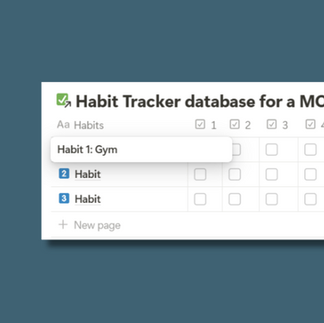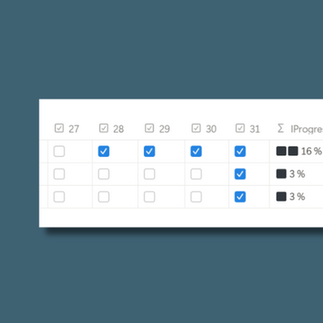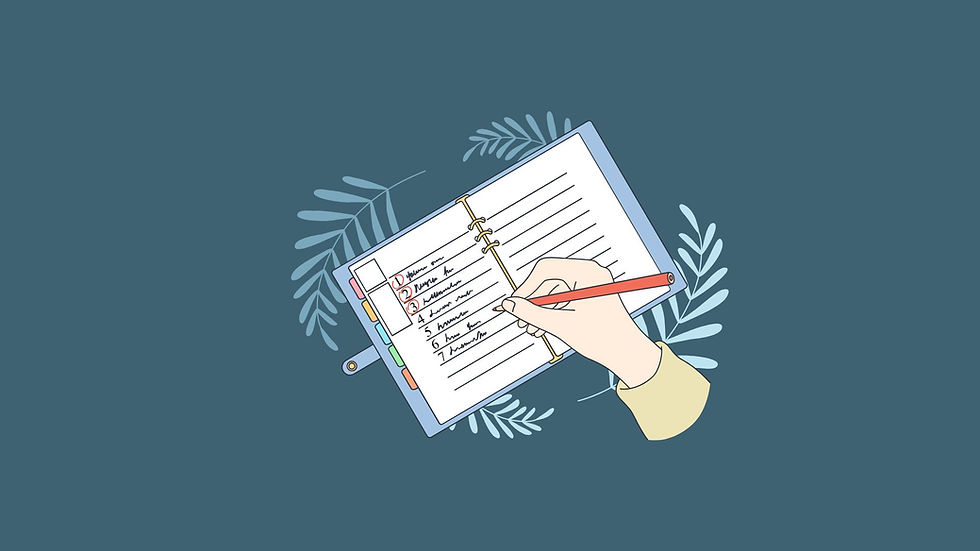How Habit Tracker in Notion will help you on your way to your goals?
- yuliiaprybytkova
- Nov 13, 2024
- 5 min read
Updated: May 29, 2025
Content:
What Is a Habit Tracker and Why Does It Work?
In short, a habit tracker is a tool for monitoring your progress as you build new habits.
But despite its simplicity, this tool offers a surprising number of benefits. In fact, when I start listing them, some people react with, "Sounds too good to be true!"
In this article, let’s put any doubts about habit tracking to rest and dive into its many perks.
Why Even Start a New Habit?
Let's start with the question: “Why even create a new habit?”
There are two main answers:
Because it's trendy—everyone on Instagram is drinking smoothies in the morning and meditating, or
Because you have a goal! (read about my “Goals and Habits” course HERE)
When the goal is ambitious—like losing weight or building a business—it’s easy to either freeze up at the enormity of it or rush through, like Adam Sandler’s character in Click who "fast-forwards" through life's tough moments.
BJ Fogg (American social scientist, Stanford professor, and author of Tiny Habits) suggests breaking big goals into micro-steps.
We’re all familiar with “eating the elephant one bite at a time,” but the professor emphasizes that small, manageable steps (essentially microdosing) help the brain adapt, reinforcing positive behavior each time we check off a success.
And what’s our tracker with its checkmarks if not some of the best “microdosing” the brain could ask for?

Millions are built from thousands; “minus 20” comes from a thousand “minus one.”
In this way, a tracker, first and foremost, helps us ground ourselves in the “here and now.” Because NOW is all we truly have (cue tiny Yoda mode).
Secondly, each filled square is a small firework, a win, and a reward, triggering a dopamine release—the neurotransmitter linked to satisfaction and habit formation. (This is explored by Charles Duhigg, Pulitzer Prize-winning author of The Power of Habit and Smarter Faster Better).
We humans are simple, very susceptible to dopamine. It’s no wonder social media, news sites, and streaming platforms captivate us like nicotine or alcohol. But if there’s a simple, safe, and free way to trigger a small dopamine hit, why not use it?
How Does a Tracker Influence Your Energy Levels?
One of the most common complaints in doctor’s offices, according to my endocrinologist, is “lack of energy or zest for life” (by the way, that’s exactly why I went to him!). Of course, there are many potential reasons for these complaints, but among those that won’t show up in a blood test is the cognitive load on our nervous system.
Psychologist Daniel Kahneman highlights that tools like planners and trackers, where we unload our thoughts and tasks, help reduce the brain’s cognitive load and alleviate “decision fatigue,” freeing up energy for goals and just living!
This is precisely why in my program, "From Life Vision to Wardrobe Order," we unload all thoughts, tasks, ideas, and plans, organizing them in such a way that everything has its place, with the main goal of less stress, more energy, and clarity. More about the program here.
Reducing Stress with a Tracker
In Why Zebras Don’t Get Ulcers, Robert Sapolsky (American neuroendocrinologist, professor of biology, neurology, and neurosurgery at Stanford) explores the impact of stress on the human body and emphasizes that predictability and control help reduce stress and strengthen health.
When faced with chronic psychological stress (from deadlines or social demands, for example), our stress response can lead to problems like heart disease and immune disorders, not to mention general anxiety and fatigue.
Of course, it’s not my goal to turn people into control freaks who follow every step according to a strict schedule. But if planning and using a tracker can help create routine, add predictability, and bring a sense of order, then I’m all for any safe and simple stress management method!
Using a Habit Tracker: How and Where?
Though I’m a big fan of Notion—I’ve created not only a habit tracker but also a comprehensive life management system here—I’ll admit that you can keep a tracker anywhere. The key is convenience! Personally, I started with a journal, sketching out a monthly chart with pencil and ruler, then used Google Sheets, and now I’m set with Notion.
Let’s break down the pros and cons of each option:
Paper Tracker—or a printed chart. Pros: free and quick. Cons: paper has its downsides—easy to lose, forget, stain, or tear.
App-Based Habit Tracker. Pros: always on hand, with reminders and stats. Cons: apps often have paid subscriptions and limited features for comprehensive planning. Covering all life areas—daily, monthly, budget, wardrobe, etc.—might require multiple apps, and you’ll likely end up using just one.
Tracker in Notion—my favorite, for countless reasons. A one-time template purchase replaces numerous subscriptions, and with a bit of familiarity, you can use it as a starting point to build your own life management system. Here, you can keep all your goals, plans, dreams, and tasks in one place. Get the habit tracker template HERE.
How to Choose the Right Habits and Tips for Tracking
1. Don’t Overload with Too Many Habits
Start with three habits, and only add another one after 1-3 months, once the first habits are ingrained and you no longer need to mark them in the tracker. By this point, you’ll have secured your achievements on multiple levels: visually (in the tracker), behaviorally (formed habit), and psychologically—through increased self-esteem, confidence, and a sense of success.
2. Start with What’s Easiest for You
Most people know the “start on Monday” syndrome, but in practice, it’s better to start with what comes naturally. If you, for example, love exercise but aren’t particularly interested in meditation, where should you start? The right answer: whatever is easiest for YOU! Start with exercise, build that habit, and after a couple of months, add meditation—this is the advice of James Clear in Atomic Habits—habits are easier to establish when “attached” to existing actions.
3. Don’t Be Hard on Yourself for Missed Days
If you skip a day, it’s better to analyze why. Maybe you’ve added too many habits at once or haven’t chosen a convenient tracking method. Research by Michael A. Franklin at the University of Arizona shows that self-monitoring helps solidify behavioral change. So, in my Notion template, I’ve added coaching questions for reviewing and adjusting your habit-building plans. When you buy the template, you also get a list of self-reflection questions—integrated right into the database! Template HERE.
4. Customize Your Tracker
Experiment with the number of columns or displayed days. For example, I like to see only ten days of the month at a time so I can focus on a shorter period without feeling overwhelmed by a long chart. At the end of each period, I switch to the next 10 days. This approach helps keep motivation high and simplifies visual tracking.
In the second module "Goals and Habits in Notion" of my coaching program “From Life Vision to Wardrobe Order,” we dive into goal setting and habit formation strategies that help maintain motivation and achieve lasting results. You can take this course independently, in a group, or through individual sessions.
The next online training on goals and habits runs in September 2025 —just three sessions of ninety minutes each to help you structure and achieve your goals. Book in a form in a footer.















Comments